
- Details
- Written by: The Barman
- Hits: 9182

Another Tuneless Racket: Punk And New Wave In The Seventies, Volume One: Origins
Another Tuneless Racket: Punk And New Wave In The Seventies, Volume Two: Punk
Another Tuneless Racket: Punk and New Wave In The Seventies: Volume Three: UK New Wave
Another Tuneless Racket: Punk and New Wave In The Seventies, Volume Five: The American Beat – West
By Steve H Gardner (self published)
The best intentions are often derailed by practicality. After being gifted Volume One of “Another Tuneless Racket”, the plan was to acquire and read the other three back-to-back and then write a review. A fine goal but one that slipped after realising their combined volume came to almost 2,400 pages and life was getting in the way…
After delving deep into the series, it’s clear that the beauty of “Another Tuneless Racket” is that once you get your bearings, you can dive in almost anywhere, pick up on a thread and keep going. As you'll gather from the titles, each volume zeroes in on a time and place in the history of punk and new wave music, and then takes up the story of key acts. The series serves as a roadmap through the twists and turns of punk and new wave across most of the western world.
It’s meticulously researched but you’d expect that from author Steve Gardner, He’s a lanky Yank from San Diego who grew up on the US East Coast where he went to university before finding himself working in engineering. A music obsessive from an earl;y age, he'd been bitten by the punk rock bug by the time he blew out the candles on his 21st birthday cake.
- Details
- Written by: JD Monroe
- Hits: 7941
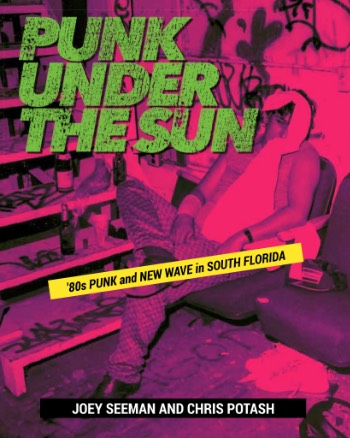 Punk Under The Sun: Punk & New Wave in South Florida
Punk Under The Sun: Punk & New Wave in South Florida
By Joey Seeman and Chris Potash
Hozac Books
I was never really drawn to Florida like so many of my ex-friends and former peers, I always called it "Ohio South" cause you know it's all the same insufferable tv brainwashed right wingers from Ohio who seem to migrate there.
Never liked Marilyn Manson or Disneyland all that much, or even Jimmy Buffet yeehaw beach culture, but weirdly a lot of musicians from all my favorite Murkkkan bands have Floridian roots.
Probably my fave band besides Generation X,Pretenders, and Beasts Of Bourbon was basically born there before relocating to Hollywood: a band called the Coma-Tones, who were, according to my famous old amigo the Sleazegrinder: "Like Jim Morrison singing for Guns N Roses". The vocalist Gio was approximately as excellent as Texacala Jones or early Tex Perkins, the guitar player Jimmy James went on to play for Junkyard and the Hangmen, and he's featured in the book.
- Details
- Written by: The Barman
- Hits: 7479
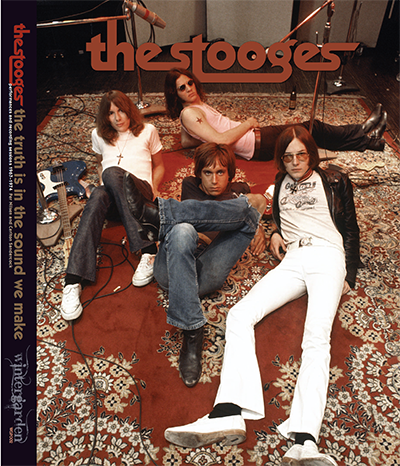 The Truth Is In The Sound We Make
The Truth Is In The Sound We Make
by Carlton Sandercock and Per Nilsen
Wintergarden Books
It is The Last Word in illustrated Stooges books.
Big statement, and the competition has been stiff.
Change my mind.
First there was 2009’s lavish “Stooges: The Authorized and Illustrated Story” by Robert Matheu (R.I.P.) and Jeffrey Morgan that chronicled the band’s two careers in pictures and essays.
Ten years later, photographer Ed Caraeff’s “Iggy & the Stooges: One Night at the Whisky” was a beautiful visual document of a 1970 Los Angeles show during the recording. of “Fun House”. It was limited in scope but evocative in execution.
A few years later, “Iggy & The Stooges: Raw Power” by the late Mick Rock followed. Rock not only captured the memorable image on the cover of “Raw Power”, taken at the Stooges’ only UK show, but a slew of images of the boys during downtime.
“Total Chaos” by Iggy and Jeff Gold contained rare documents and handbills, but was mainly text and most of the live photos were familiar.
So Wintergarden Books (publishing arm of Easy Action Records), has scooped the pool with this 300-page, hard cover behemoth.
- Details
- Written by: Patrick Emery
- Hits: 7772
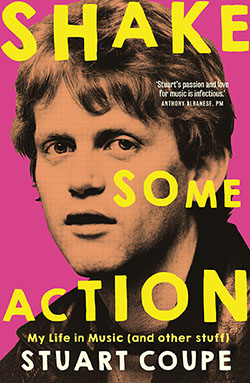 Shake Some Action: My Life in Music (and other stuff)
Shake Some Action: My Life in Music (and other stuff)
By Stuart Coupe
Penguin Books
“You’re talking to Stuart Coupe?” remarked my wife excitedly, after I told her I’d catching up with Stuart at the tail end of an impending work trip to Sydney. “Tell him I used to read his column in ‘Dolly’ all the time! We all did!”
To thousands of teenagers – especially teenage girls – in the 1980s, Stuart Coupe was the guy who wrote that column in Dolly, championing music he liked, dissing commercial dross he didn’t, and offering various observations and advice on various non-music topics, including kissing and the art of romance.
Not being a reader of the magazine, I wasn’t familiar with Coupe’s work with “Dolly”, though his by-line did appear in regular dispatches in music magazines and newspapers. Decades later I interviewed Coupe for my Spencer P Jones biography; one thing led to another, and he became instrumental – in fact, was the critical force – in my obtaining a publishing deal. So, full disclosure, I consider Stuart Coupe a friend and sincere supporter of all the best things in music.
“Shake Some Action” tells Coupe’s story, from his childhood in Launceston, to his formative years in Adelaide as a music writer, to syndicated columns (and "Dolly"!), the chaotic world of band management, the heady, drug and alcohol fuelled world of music industry largesse and the harsh economic reality of tour promotion and label ownership.
- Details
- Written by: The Barman
- Hits: 6905
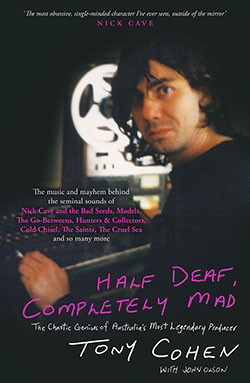 Half Deaf, Completely Mad: The Chaotic Genius of Australia’s Most Legendary Producer
Half Deaf, Completely Mad: The Chaotic Genius of Australia’s Most Legendary Producer
By Tony Cohen with John Olson
(Black Ink)
“Unputdownable” is a word and it officially entered the English lexicon in 1947. That’s a full decade before Tony Cohen came into the world, but the descriptor could have been custom-built for “Half Deaf, Completely Mad”, his posthumous autobiography.
This is a tale of hyper-energy and off-the-wall sonic experimentation cleverly disguised as a 230-page paperback. It’s a weaving, sometimes wobbling story told through Cohen’s often bloodshot or pinned eyes, with dry wit and self-deprecation.
People who worked with the man and saw his excesses first-hand might question his ability to recall fine detail, but in the same manner that Tony would feverishly splice three-inch tape to insert a crucial edit, his co-writer John Olson stitched the bits together.
Not familiar with Tony Cohen’s work? The music he produced was the soundtrack of the life of anyone into Australian underground music in the 1980s and ‘90s. The Boys Next Door, the Birthday Party, Nick Cave and the Bad Seeds, Michael Hutchence, The Johnnys, Beasts of Bourbon, Go-Betweens, Hunters and Collectors, Kim Salmon, Laughing Clowns, The Cruel Sea, The Saints, X, TISM…the list goes on. Flick through your own record collection and get back to me.
- Details
- Written by: JD Misfortune
- Hits: 4881
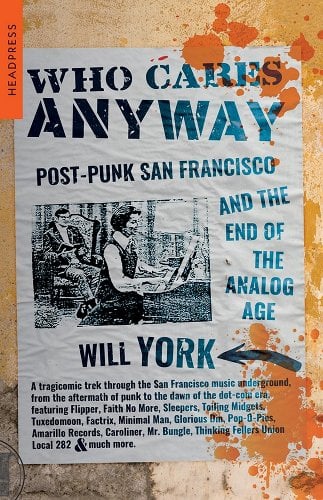 Who Cares Anyway? Post-Punk San Francisco And The End Of The Analog Age
Who Cares Anyway? Post-Punk San Francisco And The End Of The Analog Age
By Will York (Headpress)
Will York has done such an exemplary job here, in that it is a deeply entertaining read even if you aren't already intimately familiar with bands like Caroliner, Flipper, Tuxedomoon, Thinking Fellers Union Local 282, Toiling Midgets, or Pop-O-Pies.
This thoroughly researched and frequently tragic tome is sure to appeal to any music fans who still long for the pre-gentrification era, when creatives could still afford to pay the prohibitively astronomical rent for warehouses and rehearsal spaces in big cities before unscrupulous landlords with big tech money killed off urban Bohemia in this country, with Judge Dredd "stop and frisk" class patrols and a nearly universal lack of accessible egalitarian neighborhoods for working class artists.
York delves deep into the avant garde, Flipper-informed history of Faith No More and Mr Bungle - way back when metal deedler Jim Martin was still partying with high school dude-metal stoner buds Cliff Burton and all through Courtney Love's inflammatory stint as vocalist. This pre-dates the Chuck Mosely era, when "We Care A Lot" crossed over into college radio and MTV airplay, long before when Mike Patton joined the group and they went supernova mainstream in the hyper-polished commercial whiteboy funk era of the band and their defiantly unpop experimental endeavors that followed.
I find the startlingly dangerous, death taunting, law scorning, ledge dwelling excesses of the Sleepers’ Ricky Williams and Michael Belfer of particular interest, but the heavy book is spilling over with twisted tales of debauchery, comedy, community and collaboration in the post-punk era. Recommended.
![]()
- Details
- Written by: The Barman
- Hits: 4446
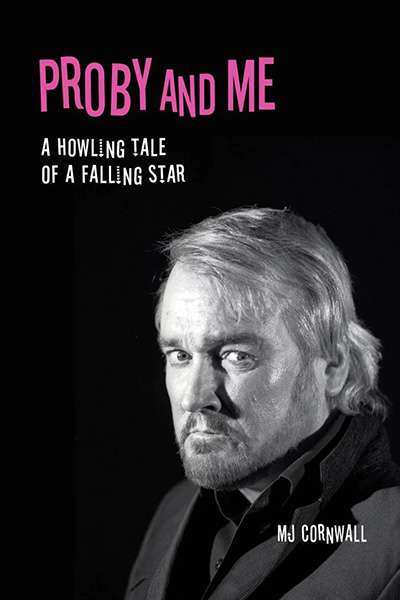 Proby And Me. A Howling Tale of a Falling Star – MJ Cornwall (BookPOD)
Proby And Me. A Howling Tale of a Falling Star – MJ Cornwall (BookPOD)
The label doesn’t lie. “Proby And Me” is a runaway train of a story, a rollicking saga of a disastrous “tour” down under by the trouser-splitting, UK-exiled Texan-born ‘60s pop star who was, briefly, as big as the Beatles.
The context: Ex-publican Brett Stevens (aka Brett Eldorado) and former Hoodoo Guru Clyde Bramley had lured the man to Sydney - and he barely made it past the front door of the Hopetoun Hotel.
By 1990, Proby’s currency as anything but a cult item had well and truly faded. He was plucked from a housing estate in the north of England where his performing stocks were low, his live appearances limited to a circuit of scrappy workingman’s clubs and seaside summer resorts.
Proby’s would-be promoters flew him to Sydney, put him up in a Bondi hotel and paid his considerable bar tabs. At least his food bill would have been minimal. PJ sounds like a graduate from the Eating Is Cheating School.
Attempts to match Proby with a backing band were fraught - his preference was a full orchestra - musicians who “read” - and his promotional appearances in media were sporadic and booze-sodden. A warm-up gig in Newcastle and an inner-city stand at Paddington RSL that sparked a mini riot were the only shows.
Author Mark Cornwall tells the story through the eyes of Eldorado - or should that be ears as Proby never shuts up. It’s 321 pages of staccato chatter and patois - delivered like machine gun fire in the style of James Ellroy.
It’s a story that’s exceedingly well told, with grim humour and massive swathes of colour.
Proby namechecks everybody from Jimi Hendrix to The Doors, Marc Almond to Elvis and Kim Fowley to Jimmy Page, in recounting a storied life mostly spent clutching defeat from the jaws of victory. What’s more, the yarns have all been verified to be true, and their common denominator is that when it turned to shit, it was always somebody else’s fault.
- Details
- Written by: Robert Brokenmouth
- Hits: 4202
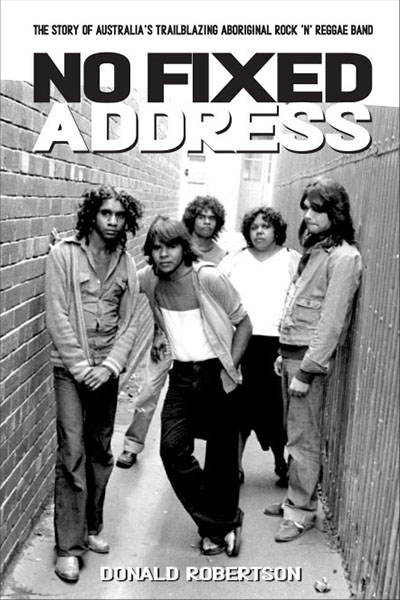 No Fixed Address by Donald Robertson (Hybrid Publishers)
No Fixed Address by Donald Robertson (Hybrid Publishers)
“No Fixed Address” is a magnificent achievement. It's also readable, interesting, engaging and fucking disgusting.
We'll get to the latter comment in a bit.
As you know, one of the few benefits of lockdown was that some great work has emerged - but we're damn lucky it's Donald Robertson who decided to write about No Fixed Address. He was there at the time, was an aware chap, and wrote extensively about the scene he was so much a part of in Roadrunner magazine. Also, Robertson's approach resembles that of a historian approaching The Rolling Stones.
Why? Well, while you may not have seen them, or even heard of No Fixed Address, the band's importance in Australian Aboriginal history is bloody enormous. Robertson gets this so well that, in the opening chapter, we discover that NFA would not have existed but for the determination of a number of significant people to encourage, enthuse and integrate Aboriginal people into the Adelaide arts culture, long before the band had learned to play.
In the late 1960s and early 1970s, this was fairly unheard of; so it is, in a way, no surprise that names like Leila Rankine, Catherine Ellis, Ted Strehlow and Veronica Brodie all turn up as incidental characters.
Don't recognise the names? Go to the “Australian Dictionary of Biography” (aka the ADB online); you don't get an entry in there for sitting on yer bum watching “Drone and Away”, “Australia's Got Alkies”, “These Kitchen Fools” or “Married at First Fart”. (ED: You left out “The Farmer Wants a Root”.)
- Details
- Written by: The Barman
- Hits: 4024
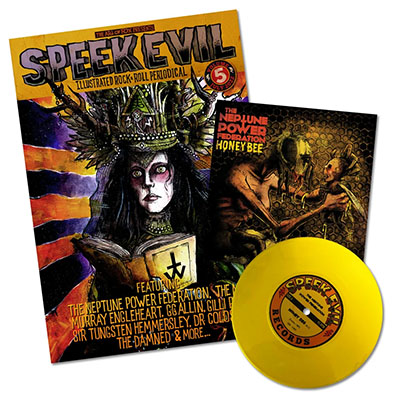 Speek Evil: Illustrated Rock and Roll Periodical (The Art of Fox)
Speek Evil: Illustrated Rock and Roll Periodical (The Art of Fox)
Reviewing what’s a visual feast served on paper pages is a challenge at the best of times but who doesn’t love a test? “Speek Evil” is neither a zine or a comic – call it a zomic if it makes you happy - because it combines the best of both, and it’s chock full of dark imagery and rock and roll attitude.
Which should come as no surprise, as it’s the product of the mind and pen of Mike Foxall, late of Nancy Vandal and more lately guitarist in The Neptune Power Federation. Foxall is one of the pre-eminent rock and roll graphic artists of the Sydney underground scene.
He’s a member of a club that boasts Ben Brown, Ray Ahn and Glenno Smith, and his imagery adorns the covers of his current band’s albums, plus posters and T-shirts for Crapulos Geegaw, King Parrot, Frenhal Rhomb and The Australian Beef Week Show. He’s also an animator.
“Speek Evil” is a lavish, full-colour 80-page production printed on high-quality matt paper and is produced quarterly. It plumbs similar cultural depths as “Unbelievably Bad” used to, but with Foxall’s own punk rock pre-occupations and peers in evidence. It’s up to five editions.
More Articles …
- "Red White and Blue" is the roadmap for a stunning trip
- Pursuing redemption as a hornet's nest is kicked
- This tale of London's rock and roll underworld is a gas gas gas
- Labour of love produces a stunning legacy
- Get a little slice of Matt Ryan's Melbourne rock and roll obsessions in your mailbox
- Fascinating dive into Oz music's hit factories and backyards
Subcategories
Behind the fridge
Artifacts and reviews from days gone by.
Page 171 of 183
